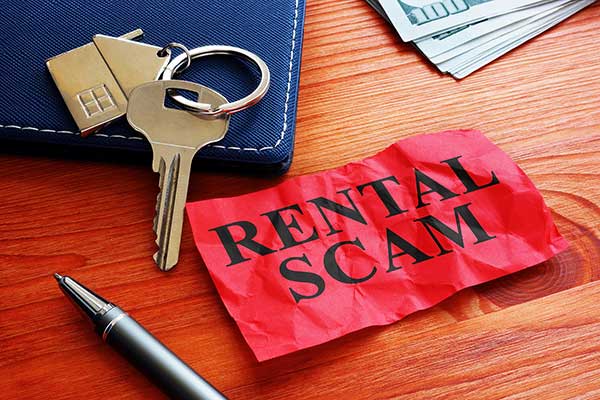Rental fraud: how to spot a fake listing and what to do if your deposit is stolen

We reveal how an unlucky loveMONEY reader was conned out of his £800 deposit when looking for a new place to rent.
Rental fraud occurs when someone is tricked into paying a deposit to rent a property that either doesn’t exist, has already been rented out or has been offered to multiple people.
We talked to someone who was targeted by this scam and share tips to help you stay safe if you’re planning on renting a property.
Clone firm investment scams: how to spot them & stay safe
‘The price wasn’t bad’
In January, Joseph (the victim’s name has been changed for anonymity) contacted someone on SpareRoom about renting a room in Central London for £800 per month.
“The price wasn’t bad for the location,” explained Joseph.
On Zoopla, there were several rooms available to rent in the same area for £800 per month or under at that time, so this wasn’t an unrealistic price to pay.
Joseph received a call from a man claiming to live in the flat who was looking for a new roommate.
He sent Joseph a video of the property and described it in detail and gave him time to think about whether or not to move in.
It’s worth stressing that Joseph could not visit the property due to coronavirus restrictions at that time.
After mulling it over, Joseph confirmed he would move in, and was sent a detailed agreement, which he signed digitally.
The scammer also sent Joseph a copy of his passport – his details matched those on the agreement, making the contract appear more legitimate.
‘How I lost £100,000 to scammers’

‘The name didn’t match the account’
The bank account details mostly matched the rental agreement – initials were used for the first and middle names, but the last name was the same.
When Joseph tried to send money, he said that Revolut warned him the name didn’t match the account exactly, but he was told by the scammer it was due to the initials being used instead of his full name.
It’s worth stressing that there have been many media reports of Confirmation of Payee refusing payments for legitimate transfers due to slight differences in the name used.
Joseph assumed this was one such case and sent money for the deposit.
The next day, he received an email from SpareRoom warning him that they believe he was scammed.
He was told to stop all communication and to report any emails from the suspected scammer to aid their investigation. SpareRoom then removed the listing from its site.
Joseph reported the suspected scam to his bank Revolut and was told it would try to recover his money, but this came to nothing.
He also reported the scam to Action Fraud and was told he should stop talking to the scammer and not go to the new place as the residents may be completely unaware of what was happening.
The scammer actually remained in contact with Joseph, unaware that he knew that he was conned, but he soon terminated contact.
After Revolut said they couldn’t reimburse Joseph, he got in touch with loveMONEY for help.
‘I lost over £20,000 in a fake loan scam’
What happened next?
I contacted Revolut and pointed out how believable and sophisticated the scam was, as well as how the bank account details were very similar to the details provided by the scammer.
After investigating, Revolut reversed their decision and reimbursed Joseph £800.
“Unfortunately, we cannot disclose information regarding the details of Joseph’s case or ongoing financial crime investigations, however we can confirm that in this instance we were able to offer a full refund,” said a spokesperson at Revolut.
“We are fully aware of the industry-wide risk customers face of being coerced by organised criminals.
“Our sophisticated and comprehensive anti-fraud systems have a strong track record of spotting, stopping, and reporting criminal activity.
“We continue to invest heavily in anti-fraud technology and to evaluate fraud cases on an individual basis, doing our best to support customers who have fallen victim, despite taking every necessary precaution, where appropriate.
“We advise customers to be careful before transferring large amounts of money, especially to people they do not know.
“We also ask customers to confirm that they know and trust the payee where a payment is being made to a new beneficiary.
“We provide ‘Confirmation of Payee’ which enables them to check that the beneficiary’s details match the name they are using, and we advise customers not to make the payment if they are unsure, as they may not be able to recover their funds.”

How to stay safe
The coronavirus pandemic has made it easier for fraudsters to operate as it made it more difficult to do essential things like travelling or checking out a property to buy or rent when lockdown restrictions were in place.
SpareRoom has revealed a range of scams to look out for with tips on how to spot (and avoid) a scam.
It recommends that you don’t hand over any money or transfer money via Western Union unless you know the person – and you’ve seen the property yourself.
Can’t see the room yourself? SpareRoom recommends asking someone you trust to view it for you, but you can also conduct a Google image search to see the exterior of the property.
Another red flag for a rental scam is if the room for rent is unusually cheap for the area, so make sure you understand what the average prices are for your desired area.
If you’re using a letting agency to rent a room, check the name of the business on Companies House and make sure they are registered with a Property Redress scheme.
You can also check the office address – if it looks like a temporary office space, they might not be legitimate, plus you can research the company online, although some scammers may have created a site.
And finally, make sure you don’t transfer money to a pre-paid card – you won’t have legal protection to claim your money back if the individual disappears with your money.
You can use a sort code checker to find out whether the account is a genuine bank account or a pre-paid service.
For more information on scams to look out for, check out SpareRoom’s handy scams roundup.
This article was originally published in March 2021 and has been updated.
Want more stories like this? Head over to the loveMONEY homepage, follow us on Twitter or Facebook or sign up for our newsletter and let us send the news to you!
Comments
Be the first to comment
Do you want to comment on this article? You need to be signed in for this feature